Intel 10th Gen H-Series CPUs bring 5Ghz to laptops: What you need to know
10th Gen H-series hits 5Ghz, adds Wi-Fi 6
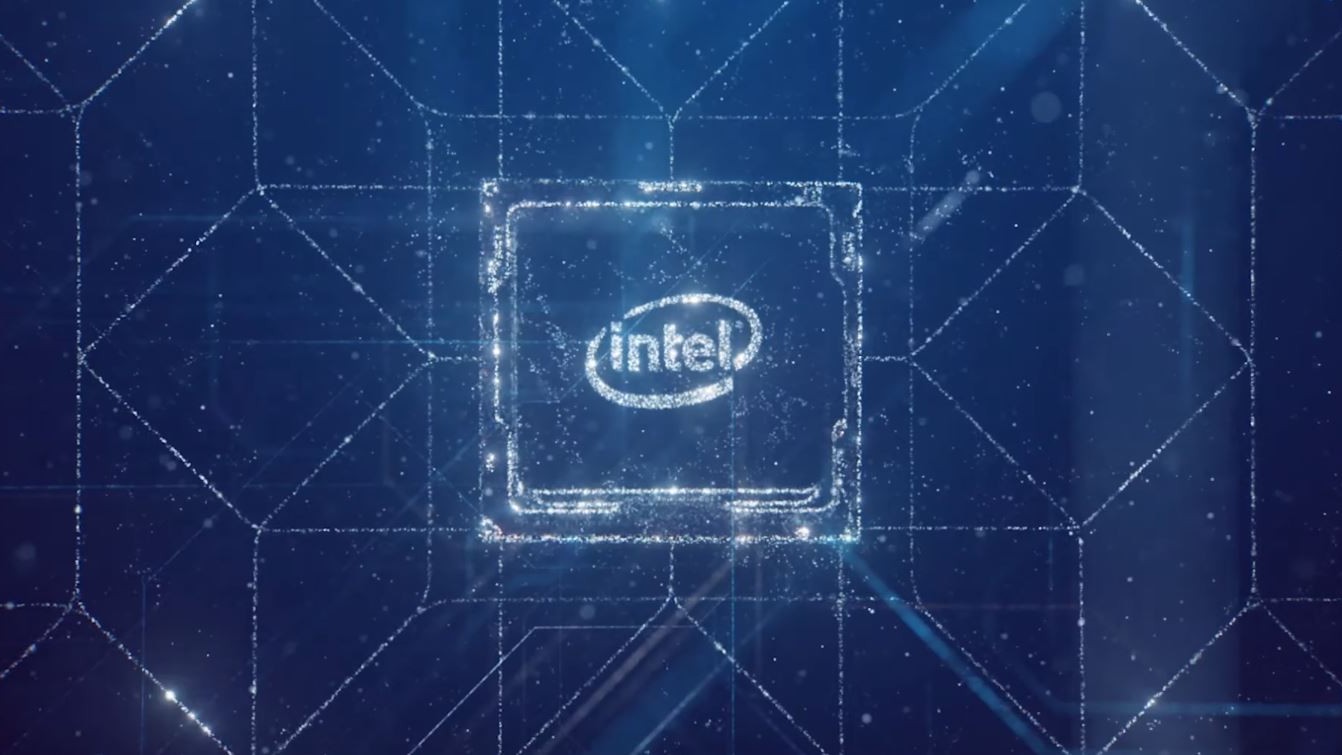
Sign up to receive The Snapshot, a free special dispatch from Laptop Mag, in your inbox.
You are now subscribed
Your newsletter sign-up was successful
Today, Intel unveiled its new 10th Gen H-series processors, the first in a laptop to break the 5Ghz barrier. These chips will power next-gen gaming, business and performance laptops expected to arrive in the coming months.
The new Comet Lake-H processors should deliver a solid performance boost over the current 9th Gen CPUs, but don't expect a miracle. Intel 10th Gen H-series chips are still 14-nanometer processors and, unlike U- and Y-series processors, there's no 10nm Ice Lake version.
- Laptop Processor Comparison: Which CPU Is Right For You?
- Best laptops in 2020
- Intel 10th Gen Ice Lake CPU Benchmarked: Here's How Much Faster It Is
What you get with 10th Gen H-series is 5.0Ghz boost speeds across the majority of SKUs, along with additional connectivity features. Intel says H-series CPUs are already set to launch in 100 different laptop models across consumer and commercial, 30 of which are considered "thin and light."
Intel 10th Gen Comet Lake-H performance
Let's get right to the numbers. Intel showed us a slideshow with charts revealing the performance of the new 10th Gen chips. The chipmaker likes to compare new chips to PCs from 3 years ago, so that's the best we've got until we do our own benchmarking against 2019 models.
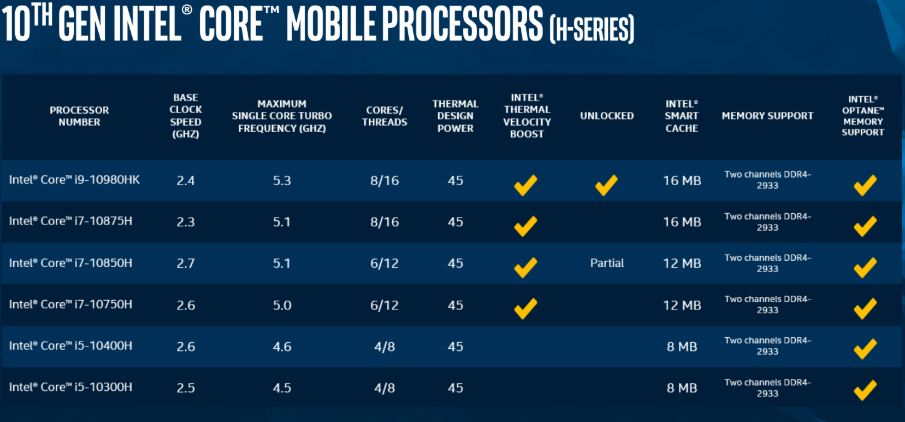
Intel's top-of-the-line CPU for 10th Gen H-series is the Core i9-10980HK, an 8-core, 16-thread CPU running at a max 5.3Ghz. Compared to the Intel Core i7-7820HK, the Core i9 delivers 44% better performance, a 53% boost in gaming and twice the 4K video rendering speeds.
However, only the most expensive laptops will get the Core i9 CPU. The majority of high-performance systems will get the Core i7-10875H or Core i7-10750H. The latter, a 6-core processor set to debut in premium gaming rigs, offers a 33% increase in performance and 44% bump in gaming speeds when compared to a 3-year-old system.
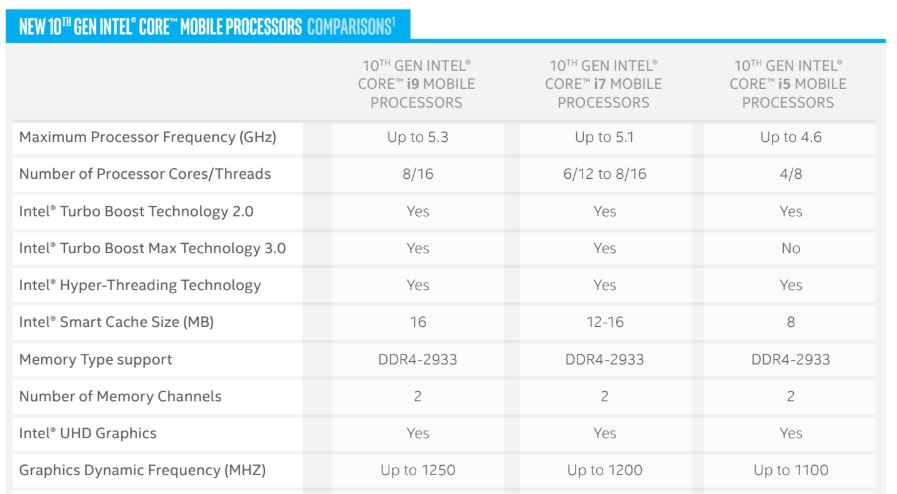
That said, many gaming machines and premium laptops for content creation will use the higher-end Core i7-10875H, which has 8 cores and 16 threads like the Core i9, but runs at a maximum of 5.1GHz. Unfortunately, Intel didn't have any performance figures ready for the premium Core i7, so we'll have to wait for laptops to arrive at our (home) office.
Sign up to receive The Snapshot, a free special dispatch from Laptop Mag, in your inbox.
Intel 10th Gen Comet Lake-H gaming performance
Laptops with H-series processors make up the vast majority of gaming laptops, so these new 10th Gen chips will matter to gamers who need the fastest components to play at high frame rates. You might be wondering what CPUs have to do with gaming. Games actually use a combination of GPU and CPU power, and some lean heavily on the processor. Because of this, high frequencies and more cores can result in better frames per second and lower latency.
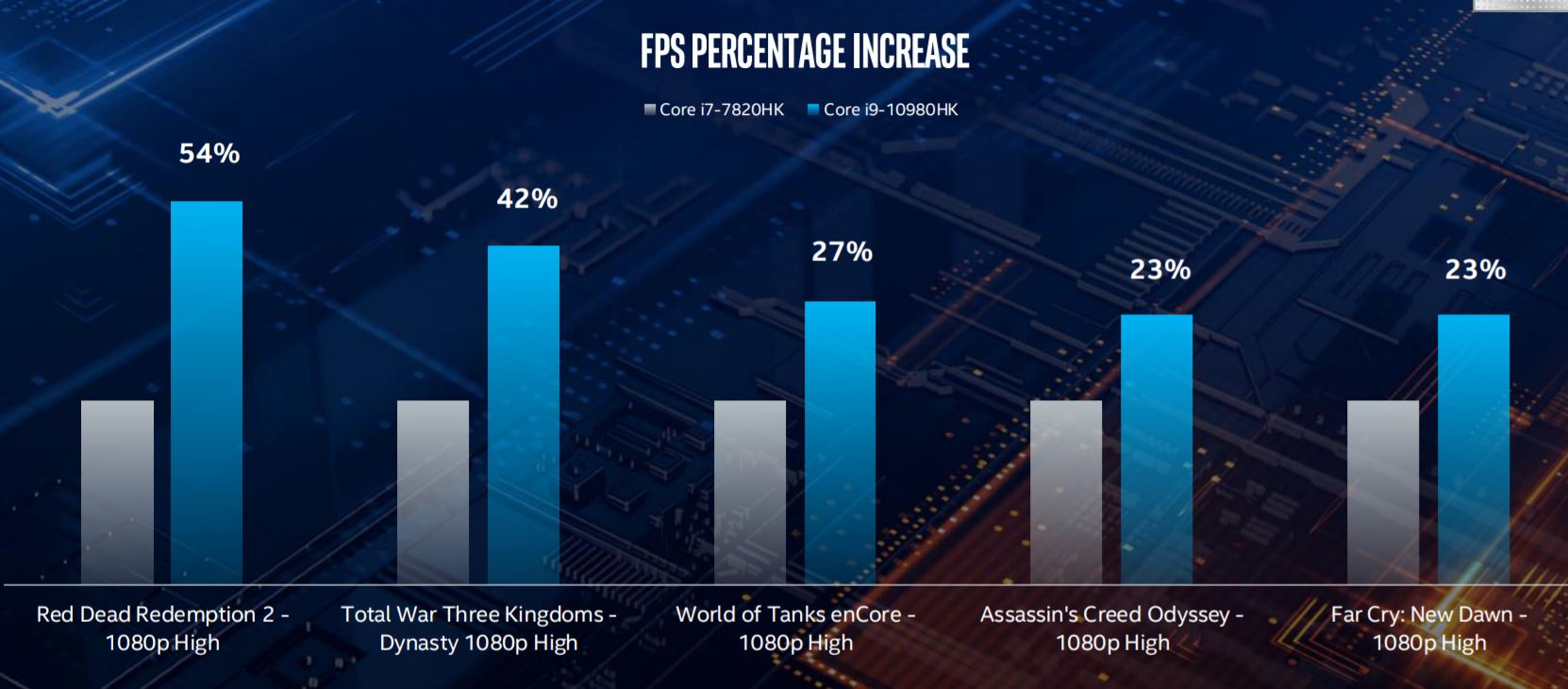
To that end, Intel promises significant performance gains when playing the latest AAA titles. For example, the Core i9-10980HK CPU will run Total War: Three Kingdoms (1080p, high) 42% faster frames than the Core i7-7820HK from a few years back. The gulf in performance isn't as profound in other games, like Far Cry: New Dawn (23%) or Assassin's Creed Odyssey (23%), but you will still notice a difference.
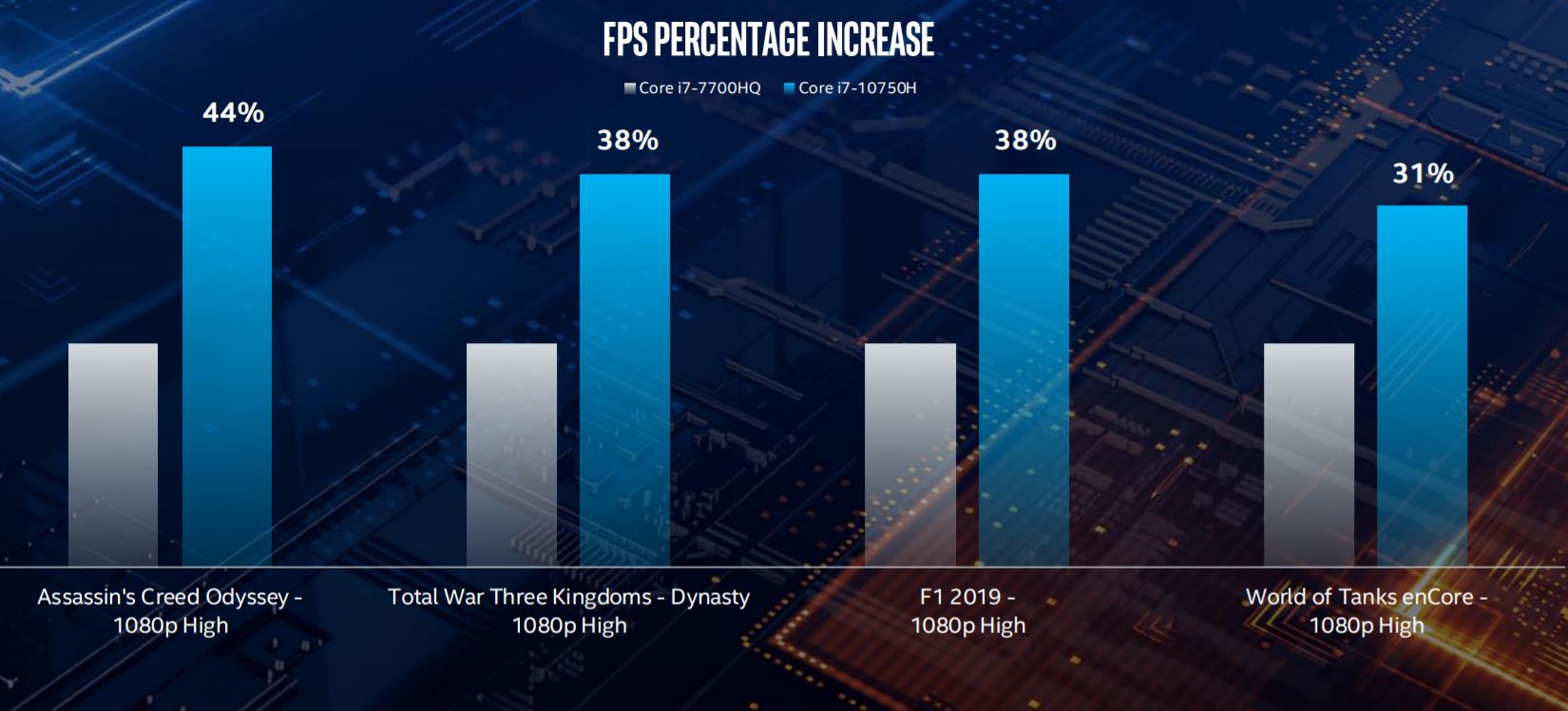
The new Core i7-10750H CPU outperforms the Core i7-7700HQ in the game F1 2019 by 38%. You'll see similar gains when playing Total War: Three Kingdoms and Assassin's Creed Odyssey (44%).
We didn't see any performance benchmarks for the Core i510400H CPU, but Intel promises the 4-core, 8-thread chip will crush the previous mid-range version.
Intel 10th Gen H-series features
It's not all about performance numbers. You could even argue that the new features enabled by the 10th Gen chips are just as important as the performance gains. Some of these we've seen before with 10th Gen Ice Lake and Comet Lake chips, while others are new for H-series.
We'll start with Wi-Fi 6, the latest connectivity standard for high-speed internet. H-series chips will support Wi-Fi 6 via an Intel AX201 network card. Whether you're playing online or streaming movies, Wi-Fi 6 provides lower latency for gaming and 3x faster theoretical speeds with twice the bandwidth for smoother streaming. It's a nice feature to have on your laptop, but you'll only benefit from Wi-Fi 6 with the proper router and a speedy internet connection.
Power users will appreciate the added support for up to 128GB of RAM. Yes, I'm talking about memory. While this is overkill for the vast majority of users, business pros who use a workstation to crunch numbers can always benefit from more RAM. On a similar note, Intel chips now support up to DDR4-2933 memory, an improvement over Coffee Lake-H's DDR4-2666.
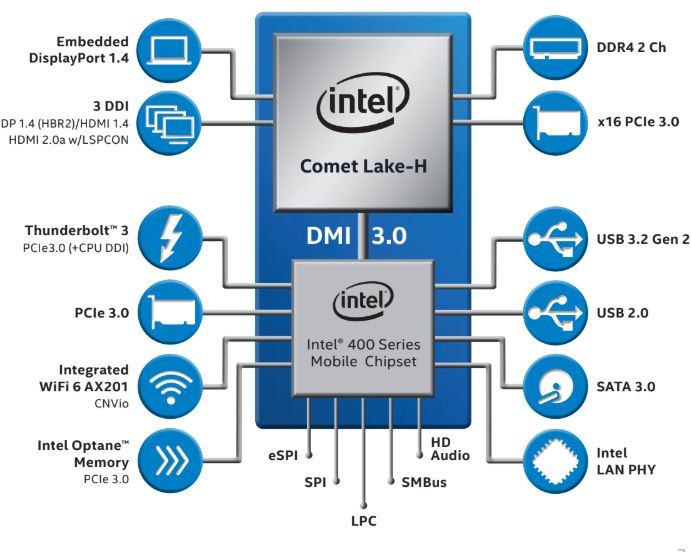
Thunderbolt 3 has been widely adopted, and we expect to see the port on more gaming and productivity laptops later this year. While Thunderbolt 3 isn't integrated into Comet Lake-H, the new chips will support two controllers for up to 4 ports. If you're not familiar with the USB-C standard, Thunderbolt 3 enables super-fast transfer speeds and the ability to connect to multiple 4K monitors.
Another new feature coming to Comet Lake-H is what Intel calls Speed Optimizer. This is a new technique that overclocks certain processors with a single click. Of course, it will only work on unlocked processors that can be overclocked, such as the Core i9-10980HK. Optane memory, Intel Adaptix Dynamic Tuning, and Turbo Boost Max Tech 3.0 return in 10th Gen for optimized performance while vPro CPUs for business machines will arrive later at a later date.
Outlook
It might be another 14nm chip, but the new Comet Lake-H CPUs from Intel should provide another solid performance jump from the previous chips along with Wi-Fi 6, Thunderbolt 3 support, and more.
The real question is how they hold up to AMD's 4000-series processors, which blew us away in our Asus ROG Zephyrus G14 review. Breaching the 5Ghz barrier for 60% of CPU SKUs is a great start -- but we'll learn more once we get review unit running on these Comet Lake-H processors.
Phillip Tracy is the assistant managing editor at Laptop Mag where he reviews laptops, phones and other gadgets while covering the latest industry news. After graduating with a journalism degree from the University of Texas at Austin, Phillip became a tech reporter at the Daily Dot. There, he wrote reviews for a range of gadgets and covered everything from social media trends to cybersecurity. Prior to that, he wrote for RCR Wireless News covering 5G and IoT. When he's not tinkering with devices, you can find Phillip playing video games, reading, traveling or watching soccer.

